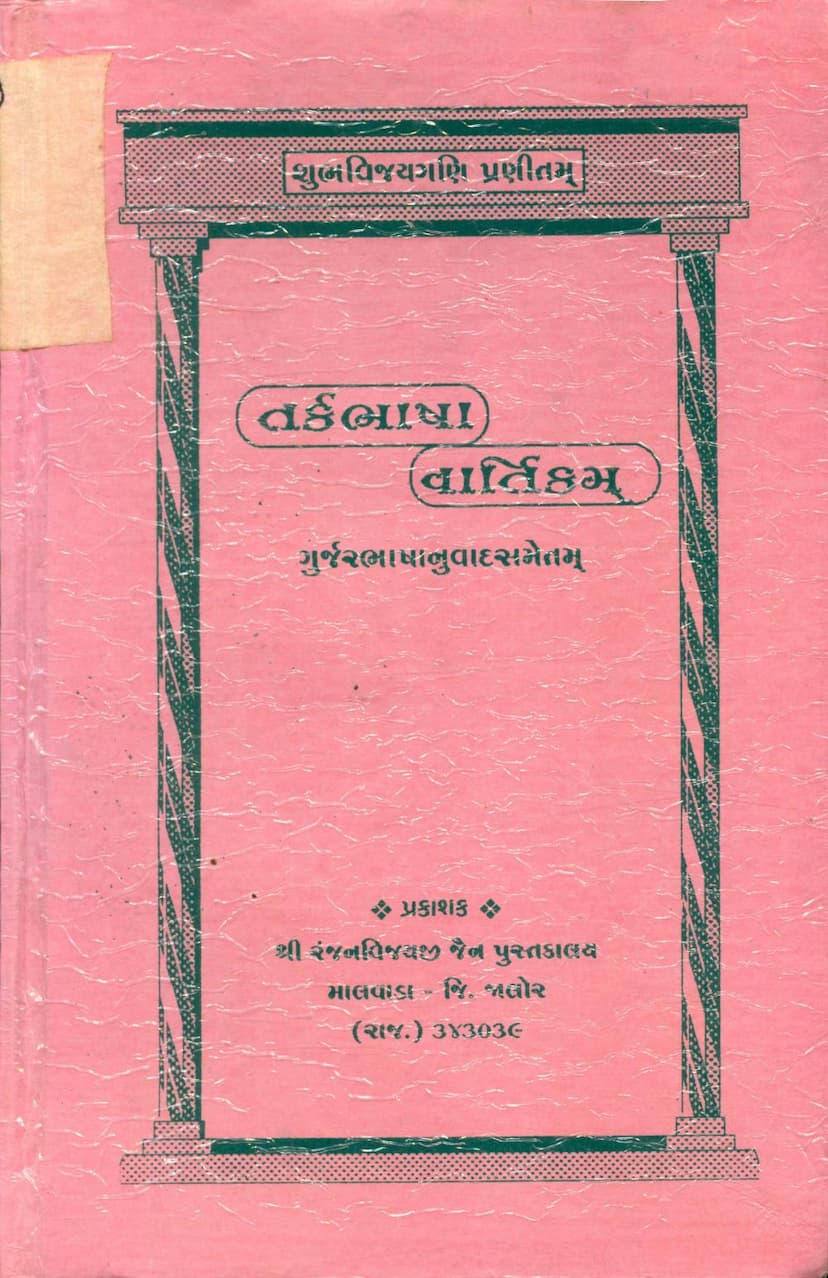Tarkbhasha Vartikam
Added to library: September 2, 2025

Summary
Here is a comprehensive summary of the Jain text "Tarkbhasha Vartikam" by Ratnajyotvijay, based on the provided pages:
Book Title: Tarkbhasha Vartikam (तर्कभाषा वार्तिकम्) Author: Muni Ratnajyotvijay (मुनि रानज्योट विजयजी म.सा.) Original Author of Tarkbhasha: Pandit Keshavmishra (पंडित केशवमिश्र) Commentator/Author of Vartika: Shubhajay Ganisurishwarji (शुभविजयगणि) Publisher: Shri Ranjanvijayji Jain Pustakalay, Malwada, Rajasthan (श्री रंजनvijयजी जैन पुस्तकालय मालवाडा)
Overall Purpose and Content:
This publication presents the "Tarkbhasha Vartikam," a commentary and Gujarati translation of Pandit Keshavmishra's "Tarkbhasha." "Tarkbhasha" itself is an introductory text on the Nyaya and Vaisheshika philosophical systems. It provides clear definitions and explanations of the key principles of Nyaya philosophy, particularly its sixteen categories. The "Vartikam" and its Gujarati translation aim to make these complex philosophical concepts accessible to a wider audience, especially beginners, enabling them to engage with the subtle points of Jain philosophy and progress towards the ultimate goal of liberation (Moksha).
Key Aspects and Contributions:
-
Accessibility: The primary goal of this publication is to present an important philosophical work in an easily understandable manner. The Gujarati translation aims to bridge the gap between the Sanskrit original and the Gujarati-speaking reader, ensuring that the essence of the philosophical discourse is preserved.
-
Commentary and Clarification: The "Vartikam" by Shubhajay Ganisurishwarji serves as a commentary on Keshavmishra's "Tarkbhasha." This commentary is intended to clarify the text, making the study of Nyaya and Vaisheshika philosophy more approachable for students.
-
Foundation in Jain Philosophy: While "Tarkbhasha" itself is a non-Jain philosophical text (focusing on Nyaya and Vaisheshika), its study by Jain scholars is significant. The publication highlights the Jain tradition of studying and commenting on various philosophical schools, demonstrating the Jain emphasis on anekantavada (the doctrine of manifold aspects) and the ability to understand and integrate different philosophical perspectives. The introduction, "Prakashiya" (Foreword), explicitly states the desire for this study to lead readers towards the deeper principles of Jain philosophy and ultimately towards Moksha.
-
Historical Context: The text delves into the author's time and the importance of "Tarkbhasha" as an accessible introduction to Nyaya philosophy. It mentions that "Tarkbhasha" became widely popular due to its ease of understanding, filling the need for simpler texts on the subject, which was often considered difficult due to the complexity of original texts like the Nyaya Sutras and their commentaries.
-
Author and Commentary: Muni Ratnajyotvijayji, the editor and translator, is acknowledged as a dedicated scholar who undertook this challenging task under the inspiration and guidance of Acharya Shree Ratnakarsurishwarji. The Vartikkar (commentator) is identified as Muni Shubhajay Ganisurishwarji, a disciple of the renowned Acharya Shree Hiravijaysurishwarji. This lineage emphasizes the scholarly tradition within Jainism.
-
Structure and Content of Tarkbhasha (as described in the Vartikam):
- Nyaya and Vaisheshika Introduction: The book is presented as a foundational text for understanding these two philosophical schools.
- Sixteen Categories of Nyaya: "Tarkbhasha" is noted for its detailed discussion of the sixteen padarthas (categories) recognized in Nyaya philosophy: Pramana (means of knowledge), Prameya (objects of knowledge), Samshaya (doubt), Prayojana (aim), Drishtanta (example), Siddhanta (established truth), Avayava (members of syllogism), Tarka (reasoning), Nirnaya (conclusion), Vada (argument), Jalpa (sophistry), Vitanda (cavil), Hevabhasha (fallacy), Chala (equivocation), Jati (futile objection), and Nigrahathana (topics for censure).
- Detailed Analysis of Pramana: The text elaborates on the first category, Pramana, discussing its definition, the nature of its instruments (karana), the distinctions between causes (karana), and the four types of Pramana accepted in Nyaya: Pratyaksha (perception), Anumana (inference), Upamana (comparison), and Shabda (testimony). It also touches upon Arthapati (implication) and Abhava (non-existence) as pramanas.
- Prameya Discussion: The twelve Prameyas of Nyaya philosophy are discussed, including Atman (soul), Sharira (body), Indriya (senses), Artha (sense objects), Buddhi (intellect), Manas (mind), Pravritti (activity), Dosha (errors), Pretyabhava (transmigration), Phala (result), Dukha (suffering), and Apavarga (liberation).
- Vaisheshika Integration: The text notes that the discussion of Artha (sense objects) in "Tarkbhasha" incorporates the Vaisheshika philosophy's five or six categories (Dravya, Guna, Karma, Samanya, Vishesha, and sometimes Samavaya).
-
The Role of the Vartikam: The "Vartikam" itself explains the purpose of defining concepts like ati-vyapti, avyaapti, and asambhavam (fallacies in definition), which are crucial for logical reasoning. It also includes a detailed discussion on the nature and purpose of Mangalacharan (auspicious invocation) at the beginning of texts, exploring various philosophical viewpoints on its efficacy and necessity.
-
Dedication: The book is dedicated to Param Gurudev Shree Ratnashekhar Surishwarji, the spiritual guru of Muni Ratnajyotvijayji.
-
Inspiration and Support: The publication received inspiration and guidance from Acharya Shree Ratnakarsurishwarji and support from Muni Shree Ratnatray Vijayji. The funding for the publication was partly supported by the Shruta Bhakti Jay Uveer Sachchari Mandan Shri Suparshvanath Jain Sangh, Madras (Chennai).
In essence, "Tarkbhasha Vartikam" by Muni Ratnajyotvijayji is a significant contribution to Jain intellectual heritage, making the intricate logic and metaphysics of Nyaya-Vaisheshika accessible through its insightful commentary and clear Gujarati translation, thereby fostering a deeper understanding of philosophical concepts and their connection to spiritual goals within the Jain tradition.